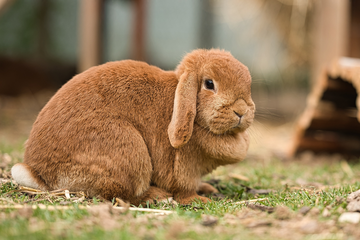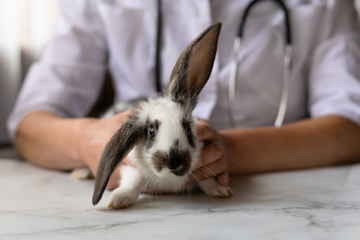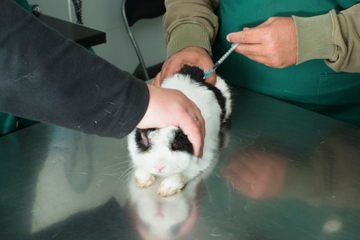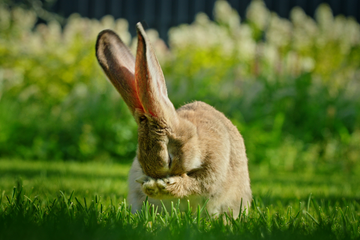Rabbit Odor Control: 8 Tips for a Fresher Home
Sharing your home with a rabbit brings boundless joy, but let's be honest—the odors they can leave behind are far less charming. Thankfully, rabbit odor control doesn't have to be a losing battle. With a few strategic adjustments and consistent care, you can minimize smells while ensuring your bunny remains happy and healthy.
Click Here For a Guide to Creating the Ideal Litter Box.

From storing hay properly to choosing the right bedding, there are numerous ways to keep your living space fresh. Below, we'll dive into detailed tips and tricks that make managing rabbit-related odors a breeze. Let's hop into it!
#1 Rabbit Odor Control Starts With Hay Storage
Hay is a staple of a rabbit's diet, and its unique smell is unavoidable—but manageable. The key is proper storage. Store hay in a cool, dry place with good ventilation to prevent it from becoming musty. Avoid keeping it in damp or humid areas, as this can lead to mold, which not only smells bad but is also dangerous for your rabbit.
If space is a concern, consider a sealed yet breathable container. This helps contain odors while maintaining the hay's freshness. Always rotate your hay stock to ensure you use the oldest batches, reducing waste and stale smells.
Quick Tip:
-
A laundry room or pantry can be an ideal location for hay storage. Just make sure it's out of reach of curious pets who might nibble into the stash!
#2 Master Litter Box Training
Litter training your rabbit is one of the most effective ways to control odors. Rabbits are naturally tidy animals, so with a little patience, most will easily take to a litter box. Start by placing the litter box in a spot your rabbit already uses for its bathroom habits. Gradually reinforce this behavior with consistent cleaning and positive reinforcement.
To prevent smells from accumulating, clean the litter box daily. Remove soiled litter and replace it with fresh material. A deep clean with pet-safe disinfectant once a week will help combat odor buildup.
Pro Tip:
-
Place a layer of hay on top of the litter in the box. Rabbits often enjoy munching while they do their business, which encourages them to use the box consistently.
#3 Upgrade Your Rabbit’s Bedding
The type of bedding you use plays a crucial role in rabbit odor control. Not all bedding is created equal. Opt for high-quality, odor-absorbing materials like Ultra Premium Food Grade Bedding. This bedding is designed to tackle odors while providing a soft, comfortable surface for your rabbit.
Why Choose Premium Bedding?
-
Super Absorbent: Absorbs up to six times its weight, reducing the frequency of changes.
-
Dust-Free: Keeps the air clean and minimizes respiratory irritation for both you and your pet.
-
Safe for Rabbits: Free from harmful chemicals and designed to be gentle on sensitive skin.
While the upfront cost might be higher, investing in premium bedding often saves time and effort in the long run.

#4 Clean Regularly and Provide Ventilation
Consistent cleaning is the cornerstone of rabbit odor control. Remove soiled bedding daily, scrub surfaces weekly, and use white vinegar and water to neutralize urine odors. Adding baking soda to your cleaning solution can provide extra deodorizing power for stubborn smells.
Ventilation is equally important. Ensure your rabbit's enclosure is in a well-aired space, and consider placing an air purifier nearby to improve air quality further.
#5 Tweak Their Diet for Better Digestive Health
What goes into your rabbit significantly affects what comes out. A diet high in sugary treats, fruits, or processed foods can lead to digestive upset and foul-smelling waste. Instead, focus on a balanced diet where at least 80% consists of high-quality grass hay, such as Timothy hay.
Hay keeps your rabbit's digestive system functioning smoothly and minimizes strong odors in their urine and feces. Incorporating fresh greens and plenty of water further supports a healthy system.
Quick Dietary Adjustments:
-
Avoid giving your rabbit excessive fruits or starchy vegetables like carrots and sweet potatoes.
-
Introduce new foods gradually to prevent digestive upset.
#6 Tackle Rabbit-Specific Odor Issues
Some odor problems are unique to rabbits. For example, their urine can be particularly strong due to its high ammonia content. Adding apple cider vinegar to your rabbit's water (1 drop per 8 ounces) can help balance their pH levels and reduce urine odor.
Grooming Is Key
Long-haired breeds and rabbits prone to "poopy butt" may require extra grooming to stay clean and odor-free. Brush your rabbit regularly, paying close attention to areas near their tail and hind legs. Consider a gentle spot-clean with a damp cloth or pet-safe wipes for more severe messes.
#7 Replace Smelly Toys
Rabbits love their toys, but over time, these items can harbor odors—especially cardboard and wooden toys. Replace these frequently to keep smells at bay. Durable chew toys, like organic apple chew sticks, are a great alternative. They're fun for your rabbit and easy to clean and maintain.
#8 Freshen the Air Naturally
While keeping your rabbit's area clean is the most effective way to manage odors, a natural air freshener can provide an added layer of freshness. Look for products specifically designed for pets to ensure they're safe. Essential oil diffusers should be used cautiously, as some oils can harm rabbits.
DIY Air Freshener Ideas:
-
A small bowl of baking soda placed near the cage (out of reach) can absorb odors effectively.
-
Simmer water with cinnamon sticks and orange peels for a natural, pet-safe scent booster.

A Fresh Routine for Rabbit Odor Control
With these tips, rabbit odor control becomes a manageable task rather than a constant challenge. Regular cleaning, premium products, and thoughtful dietary choices contribute to a fresher home. Don't forget to keep your rabbit comfortable and happy throughout the process—because a happy rabbit is the best kind of roommate!

The Rabbit Skeleton System Explained

Should You Get Rabbit Pet Insurance? Here's Everything You Need to Know

Rabbit Vaccination Schedule: A Simple Guide










